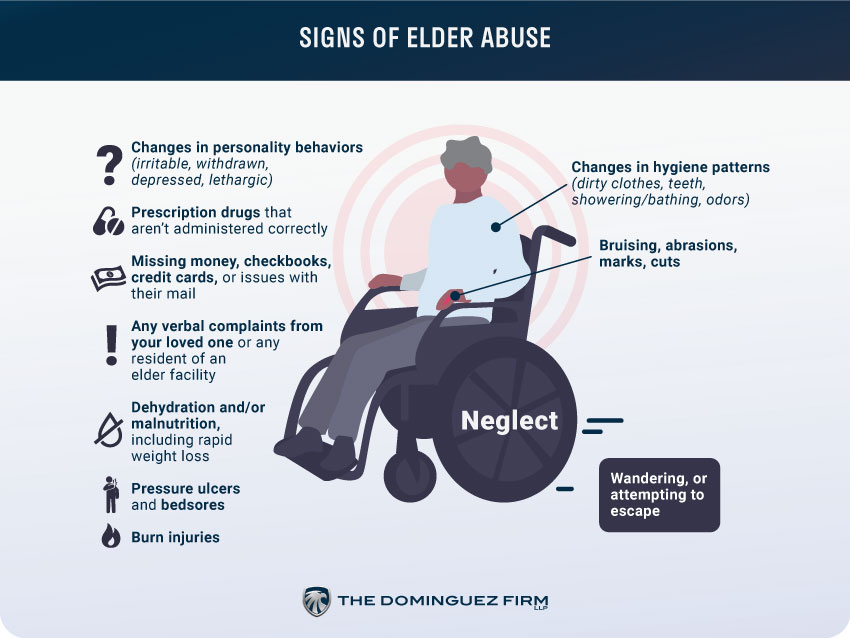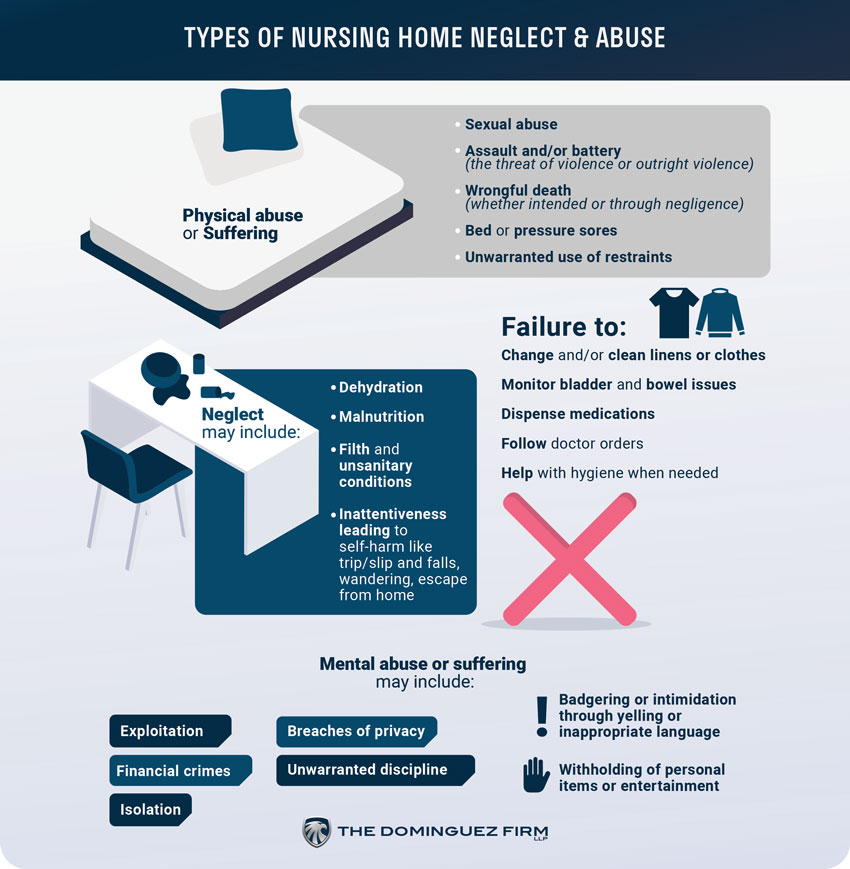While we like to think an elderly family member in a nursing home is receiving the care they need, nursing home abuse can and does happen. It might be one rogue employee or a system-wide lack of empathy and care. Either way, if you or someone close to you have been the victim of nursing home abuse, The Dominguez Firm is here to help. Call us at 800-818-1818 for a FREE and confidential consultation today. Our experienced nursing home abuse lawyers are ready to help your family obtain the justice and compensation you deserve.
Below you’ll find answers to some commonly asked questions regarding nursing home abuse and a plan of action if the unspeakable does happen.
What is nursing home abuse?
Nursing home abuse is any harm done to a nursing home resident. It can take the form of physical, emotional, financial or even sexual abuse. It can also be neglect or failure to take care of an elderly person who can no longer look after themselves.
Generally, nursing home abuse is committed by staff members. Since residents often require round the clock care, staff must be present 24 hours a day. But if a nursing home is poorly run and there is minimal supervision of the facility, residents are at higher risk of suffering nursing home abuse. This is especially true during overnight hours when short-staffing is more common.
This lack of oversight can lead to abuse by any number of people including:
- Other residents
- Visitors or
- Third parties, such as vendors visiting the facility on business
What are some signs and symptoms of nursing home abuse?

Unfortunately, nursing home abuse is not just physical abuse. It comes in many other forms too. If you see a sudden change in a loved one’s personality, it can be a symptom of nursing home abuse. A once outgoing family member who is now fearful and/or depressed could well be hiding something. Below are some of the most common examples across several categories:
Signs of physical abuse:
Nursing home staff may simply think they can get away with physical abuse because the individual is suffering from some form of dementia and can’t report any incidents. Family members should be on the lookout for unexplained bruises, cuts or broken bones, or explanations for injuries that don’t make sense.
- Repeated instances of falls and injuries where there were none previously
- Signs of physical restraint, such as marks or welts on wrists or ankles
- Bruising or cuts on parts of the body that are typically covered by clothing. This may be an attempt to cover up the physical abuse
Signs of sexual abuse:
Shocking as it may sound, seniors can also be the victims of sexual abuse while in a nursing home.
- Unexplained genital or anal bleeding
- Being diagnosed with an STD
- Bruising in the genital area
Common signs of financial abuse:
Lack of awareness on the part of the senior and/or emotional manipulation can lead to financial abuse.
- Sudden changes to an elderly person’s will or power of attorney
- Unexplained charges on their credit card or new credit cards being opened in their name
- Withdrawals from the senior’s bank account
- Overcharging for services or charging for services that were never performed
Examples of emotional abuse:
The abuse may not even involve any physical contact, but that doesn’t mean it isn’t devastating to the victim.
- Threatening or yelling at someone repeatedly
- Belittling and insulting them
- Controlling the elderly person’s environment. For example, not allowing or limiting the visitors they receive
- A senior who is frightened and on edge, especially around certain staff members
Signs of medical abuse:
Medical abuse may happen due to understaffing or may be meted out as punishment for some perceived behavioral issue on the part of the senior. Either way, it is abuse.
- Noticeable weight loss
- Receiving incorrect doses of medication, including overmedicating residents to keep them quiet
- Performing unnecessary medical procedures on a resident in order to fraudulently bill insurance companies
Examples of neglect:
Neglecting the needs of a nursing home resident can have very serious consequences and even be life-threatening. Whether it be due to short-staffing or to punish the resident, it is nursing home abuse—intentional or not. Here are some examples of neglect.
- Physical neglect, such as not bathing the person
- Ignoring requests to use a bathroom from residents who need assistance
- Not being regularly provided with meals
- The appearance of bedsores
- Unattended residents wandering away from the nursing home itself
What should I do if I suspect nursing home abuse?

First, know that here in California, there are laws protecting seniors from nursing home abuse. If you suspect a loved one is being abused in a nursing home, you can and should take action. If you fear your loved one is in danger, do not hesitate to call 911 immediately.
There are several ways to proceed:
- You can report the abuse to the police so they can conduct a criminal investigation.
- You can call the office of the California Long-Term Care Ombudsman. They can investigate any reports of nursing home abuse.
- You can file a complaint with the California Department of Public Health.
- You can file a civil lawsuit against the nursing home and/or staff responsible for the abuse.
You don’t have to choose just one course of action. In fact, you have the right to pursue all four.
If abuse or neglect is evident, you can also file a separate civil lawsuit against the nursing home in question, in addition to any criminal charges the state may file. If you do have grounds to file a civil lawsuit, you should seek the services of a nursing home abuse law firm with lawyers experienced in handling these types of cases. The nursing home will certainly lawyer up, and you should do the same. The Dominguez Firm has successfully represented the families of nursing home abuse victims and we can fight for your loved one as well.
Nursing homes by the numbers
Seniors are the fastest-growing segment of California’s population and the U.S. as a whole. Defined as people over the age of 65, their ranks are expected to continue increasing significantly in the years ahead.
As per the U.S. Census Bureau, there were approximately 50 million people over the age of 65 in 2016 or about 13% of the population. By 2034, the projected number of seniors is expected to be 77 million or over 20% of the population. 2034 is significant because it will be the first time in U.S. history when seniors are expected to outnumber children in the U.S. population.
According to the Centers for Disease Control and Prevention (CDC), as of 2016, there were:
- 15,600 nursing homes in the U.S.
- 69.3% of them were for-profit
- They served approximately 1.3 million people
All of this means that the aging of the population translates into a large jump in the number of people in nursing homes in the coming decades. Protecting vulnerable seniors will hopefully mean stronger elder abuse legislation and enforcement in the years to come.
For now, it’s important to hold nursing homes accountable for any abuse of residents. As the previous statistics show, almost 70% of nursing homes are for-profit. This increases the possibility that a facility will put profits ahead of people. Of course, not every for-profit nursing home operates in such a heartless manner, but some do.
Being vigilant and regularly checking in on a loved one in a nursing home is one way to ensure their safety. The goal should always be zero tolerance for nursing home abuse.
What is the Elder Justice Act?
Passed in 2010, Democrats and Republicans worked together to create the Elder Justice Act (EJA) to protect senior citizens from abuse, neglect and exploitation.
The law was passed to more effectively respond to elder abuse, support Adult Protective Services and provide protection to the residents of care facilities such as nursing homes. While child and domestic abuse laws have been on the books for decades, the enactment of laws for the protection of seniors is relatively recent.
The Elder Justice Act also established the Elder Justice Coordinating Council, under the supervision of the Department of Health and Human Services. As the name implies, the chief function of this council is to coordinate actions meant to curb elder abuse across various branches of the federal government.
The EJA is not without its problems. To date, the federal government has not put aside any money for the implementation of the EJA. However, members of Congress from both parties are currently working on a new, more effective Elder Justice Act. As the population of the U.S. ages, a strong effective federal law protecting seniors is crucial.
Do I need a lawyer for my nursing home abuse case?
Yes. If you bring a civil lawsuit against a nursing home for abuse, you can be certain the nursing home or the company that runs it will have an aggressive law firm by their side. Also, nursing home abuse cases can be difficult to prove. Victims may not be able to articulate clearly what abuse they’ve suffered or not have any recollection of it at all. Also, the defense may argue that any decline in health was simply a sign of aging.
Having to place a loved one in a nursing home is one of the most difficult decisions a person or family can make. Realizing that they’re being abused can be devastating. At The Dominguez Firm, our personal injury lawyers have the experience, resources and knowledge to successfully handle nursing home abuse cases from start to finish. We’ll fight to obtain justice and see that those responsible pay for their reprehensible actions.
Call us today at 800-818-1818 for a free and confidential consultation. And if you’re worried about the cost of hiring a nursing home abuse attorney, know that there are no upfront or hidden costs. Plus, we win or you don’t pay, so call us today.
Additional Information
My experience was good. They made sure to kept me in the loop and made sure to let me know what was going on the whole time. My mom has used other attorneys and this experience was beyond better. I would definitely recommend them!
— Ashley Magana
The attorneys were always available and answered my questions. I would recommend them to anyone. Zoe is the best!
— Janet Salazar
My experience with The Dominguez Firm and the attorneys was really good. They were very informative and always returned my calls.
— Jocelyn Gonzalez
